Are you intrigued by the mysteries of water? If you’re scratching your head, let me explain! Water, a simple, everyday element, has complexities you might not be aware of.
One of these is hardness. The hardness of your water can greatly affect your daily bathing experience. But, you may be asking, “Is hard water safe to bathe in?” That’s the question we’ll be exploring today, and the answer might surprise you. So, let’s take the plunge!

Decoding Hard Water
Hard water. What is it? It sounds like something you’d need a hammer to crack! In reality, hard water is water that’s high in minerals, particularly calcium and magnesium. Water hardness is measured in grains per gallon (gpg), milligrams per liter (mg/L), or parts per million (ppm). Anything over 60 mg/L is considered ‘hard’. But what does this mean for your bathing routine?
The Safety of Hard Water for Bathing
Here’s the crux of the matter: Is hard water safe for bathing? Yes, absolutely! According to the World Health Organization, there’s no evidence that hard water leads to adverse health effects. However, while not harmful health-wise, hard water can have other effects that might make your bathing experience less than luxurious.
Effects of Hard Water on Skin and Hair
The minerals in hard water can interact with soap or shampoo to form a soap curd. This residue can make your skin feel dry and itchy and can leave your hair dull and unmanageable. It can also clog pores, potentially leading to skin conditions like acne and eczema. So, while it’s not dangerous, hard water can be a bit of a nuisance for your beauty routine.
Impacts on Your Bathing Fixtures
Beyond your skin and hair, hard water can leave its mark on your bathroom fixtures as well. The minerals in hard water can build up over time, leading to limescale. This can reduce the efficiency of your appliances and may even lead to costly repairs.
Why Bathing in Soft Water is Better
Now that we’ve explored the potential downsides of hard water, you might be wondering about the flip side of the coin. What are the benefits of bathing in soft water? Let’s dive in!
Bathing in soft water can truly elevate your bathing experience. Think of it as the difference between a standard soak and a luxurious spa experience. Soft water can make your bath time more effective and enjoyable. It reacts better with soap, creating more bubbles and helping your bath products work their magic.
Interestingly, hard water is found in 85 percent of homes in the United States. That means a majority of us are pouring more bath soap into our tubs to achieve the desired amount of bubbles. However, this doesn’t just affect your bath time; hard water can also contribute to dry skin, brittle hair, and clogged pores.
Addressing Hard Water: Solutions and Strategies
We’ve already covered some strategies to combat hard water, but let’s expand on that list with a few more quick-fix solutions.
Bath Salts: Want to soften hard water naturally? Bath salts can help. They release sodium and potassium ions into the water, replacing the calcium and magnesium that cause water hardness. Plus, they can add a lovely scent to your bath!
Baking Soda: While it won’t chemically soften the water, adding baking soda to your bath can make the water feel slicker and soften your skin. Just mix about 1/2 cup of baking soda into a full tub of water and soak for around 15 minutes.
Install a Bathtub Filter: Some bathtub filters claim to soften your skin and hair by removing chlorine from the water. They might not fully soften the water, but they can reduce some of the drying effects of chlorine.
These remedies can help make your bath time more enjoyable, but remember, they are temporary solutions. If you’re seeking a long-term solution, a water softener system might be the way to go. It can soften your water throughout your home, potentially increase your water pressure, and even extend the life of your water-using appliances by preventing scale buildup.
Conclusion
In conclusion, while hard water is safe to bathe in, it might not be the most pleasant experience. Soft water can enhance your bath time, making your bath products more effective and leaving your skin and hair feeling softer and healthier. If you’re dealing with hard water, don’t fret! There are plenty of solutions available, from quick fixes like bath salts and baking soda to long-term solutions like installing a water softener system. So, here’s to softer water and happier bathing!

Jay
Jay is a health and wellness enthusiast with expertise in water quality and nutrition. As a knowledgeable advocate for holistic well-being, Jay successfully manages Type 2 Diabetes through informed lifestyle choices. Committed to sharing reliable and authoritative insights, Jay combines firsthand experience with a passion for enhancing health."
